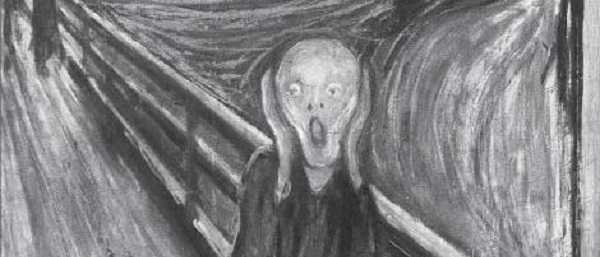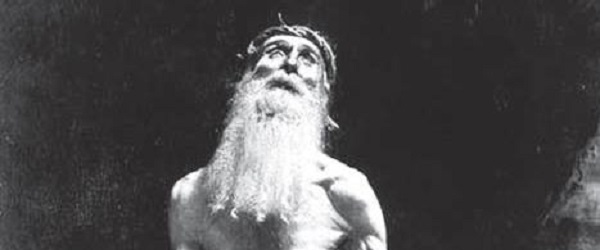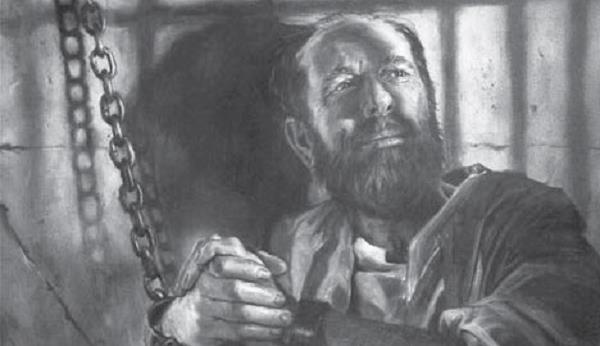A cry that echoes across heaven and earth

Christ's last cry on the cross,
Tremors echoed between heaven and earth,
Every word shouted is the highest decibel of speech...
The work "The Scream" (Norwegian Skrik may be translated as "Scream") by the great twentieth-century Norwegian expressionist painter Edward Munch (1896-1944) was collected by Peter Orlin in May 2012. The version sold at Sotheby's in New York for more than US$119.92 trillion, setting a record for art auctions.
Munch's painting style changed several times throughout his life, from naturalism to impressionism, and then to expressionism, where he painted "The Scream", which is the most valuable in the history of art. There are four paintings in the "Scream" series created by Munch, each of which was painted in 1893. (two paintings), 1895 and 1910, the paintings sold at Sotheby's are pastels on cardboard. The remaining three paintings were stolen and recovered many times and are now in the Oslo Museum.
Munch's four "Screams" depict deep human emotions such as depression, fear, struggle, pain and death at different times. They are famous in the art world, second only to Leonardo da Vinci's "Mona Lisa". The work was almost destroyed by the German Nazis during World War II.
Meng Ke's "The Scream" shouts out the pain of human nature being torn apart from the depths of the soul. The cry echoes between heaven and earth. This sound will compress or even eliminate all laughter in the world. And "I am so miserable!" is the cry that Paul makes on behalf of all mankind, a voice brewed from the bitter fruit of "original sin" inherited from Adam. Listen, here are a few miserable and helpless “crys” from the human world:

▲The picture "The Scream" sold for more than 119.92 million U.S. dollars, setting a record for an art auction.
Job's silent cry
The Book of Job has a special status in the Old Testament because neither the era of Job nor the author of the book is familiar. However, Job is recognized as a representative figure of "the suffering of the righteous". His sudden appearance , full of drama, this book is also presented in the form of a drama, and there are many scenes that are quite difficult to understand. For example, Satan was able to appear before God and accuse Job in many ways. This was also the reason for Job’s suffering. God also endorsed Job’s righteousness many times and affirmed:"There is no one like him on earth, perfect and upright, one who fears God and shuns evil." (Job 1:8)
With God's approval, Satan could attack Job to test his faith in God. Satan caused Job to suffer natural and man-made disasters, causing him to lose everything he owned, including his children. Finally, he attacked his body and made him fall from the soles of his feet. When the head of his head was covered with malignant sores, Job was physically and mentally exhausted, but he never gave up his faith in God and did not sin with his "mouth" (refer to Job 2:10). Although Job did not sin with his "mouth" They complain about God, but they start to feel sorry for themselves and curse their own birthday (see Job 3:2-26).
Job's self-curse was very vicious. He said that he should not have been born in the world at all. He would rather die on the day of conception than be born in this world. This kind of mood was far different from the happy life of being blessed in the past. Job did not dare to sin with his mouth and complained about God, but could only curse himself. Later, his three old friends would appear on the stage respectively and severely criticize Job. From Chapter 4 to Chapter 37, the long For thirty-four chapters, Job engaged in a verbal dispute with his three friends, but Job still insisted on his own righteousness:"I will never judge you as righteous, nor will I judge myself as wrong until the day I die." (Job 27:5)
We can read the injustice and resentment in Job’s heart. Although he did not dare to sin with his mouth and express dissatisfaction directly with God, the cry in his heart was like a hidden volcano that could erupt at any time. But Job’s faith and religious cultivation were unparalleled at that time and in later generations, and were extremely rare in corrupt human nature. He was finally vindicated by God, and the three friends who accused him were all condemned by God, and Job The cry hidden in our hearts that has not burst out from our mouths makes us want to shout it out on his behalf to assert the "justice" in suppressed human nature. God should have heard this silent cry.
But the "righteousness" of human nature is like the fireflies compared to the sun and the moon compared to the justice of God. When God spoke out and lifted Job from the anger of the frog at the bottom of the well to heaven, this silent cry automatically disappeared.“I heard about you by hearsay, but now I see you with my own eyes.” (Job 42:5)The silent cry of humanity dissipated in the wind, and Job’s anger was extinguished by God’s grace.
Countless believers, disciples, apostles, and saints after Job were once full of complaints and resentments, but they did not dare to sin with their mouths, but the germs of sin were hidden in their hearts, and they would also face the training of suffering, and then again Experiencing God’s abundant grace can extinguish the depression buried in the heart, turning resentment into a voice of gratitude.

▲Although Job did not dare to sin with his mouth and expressed dissatisfaction directly with God, the cry in his heart was like a hidden volcano.
An arrogant and ignorant cry from hell
"Father Abraham, have mercy on me! Send Lazarus to dip the tip of his finger in water and cool my tongue; for I am in agony in this flame!" (Luke 16:24)
Many people who worship the souls of the dead believe that once a person dies, they will have some kind of spiritual ability. When descendants worship the souls of their ancestors, they can pray to their departed ancestors to protect their descendants. This inheritance is still there today, but it was mentioned by Christ here. The rich man in the underworld revealed this superstition; not only do the souls of the dead in the underworld not have the ability to protect their descendants, but because of their sins during their lives, they were trapped in the flames and suffered after death. They were unable to save themselves, and even asked for the tips of their fingers. It's impossible to get any water droplets on it. Even though the souls of the dead have arrived in the underworld, their behaviors and habits and all their grudges and grudges have not changed. The rich man also brought some of his bad habits with him to the underworld. He often asked people to "send" his subordinates to do things, and he was arrogant and arrogant. Even if you are punished in the underworld, it will be difficult to change.
The rich man was unable to fulfill his first request, so he immediately made another request. He still asked Abraham to "send" Lazarus to do something. This time, Lazarus was to be resurrected from the dead to persuade his five brothers to change their ways. In order to avoid falling into the misery of the underworld in the future, it seemed that the rich man was quite "caring", but he only wanted to save his own blood relatives, not others. However, this request was rejected by Abraham, and he fought hard:"No, father Abraham, if someone comes to them from the dead, they will repent." (Luke 16:30)This undead rich man was arrogant and arrogant during his lifetime, and he was also unreasonable after his death. He actually refuted the words of his ancestor Abraham, "No," this man was really "unrepentant."
The cry he made here is selfish, vain, and self-righteous; when he was alive, he shouted a hundred promises, no need to shout, just give orders. After death, he was subject to the punishment of the fire of the underworld, and still had no intention of repentance, which can't help but make people sigh. , the rich man’s stubbornness was absurd, as Jude verse 11 says:“Woe to them, for they have gone the way of Cain, and for profit have gone straight into the error of Balaam, and have perished in the rebellion of Korah.”The rich man's soul has perished long ago. No matter how much he shouts, he cannot change his eternal destruction in the underworld!
Paul's moans and shouts were burning with body and soul
The grace of Christ's redemption was passed down to Paul, and there was a breakthrough in the foundation of faith, from oral testimony to a profound level of theological thinking; Paul discussed in the book of Romans two conflicting and conflicting thoughts deep in the heart day and night. Law; he said painfully:
"I also know that there is no good thing in me, that is, in my flesh. For it is up to me to will to do good, but it is not up to me to do it. Therefore I do not do the good that I want, but I do not do the good that I do not want to do. I do evil. If I do something I don’t want to do, it is not done by me, but by the sin that lives in me. I feel that there is a law that when I am willing to do good, I do it. Evil is with me, because according to my inner being, I like the law of God; but I feel that there is another law in my body that is warring with the law in my heart, and is holding me captive. from the law of sin in my members. How wretched am I? Who can deliver me from this body of death?” (Romans 7:18-24)
"How miserable I am! Who can save me from this body of death?" "The Concise Bible" translates: "What a miserable person I am! Who can save me from this (hidden in the sinful nature) must "Where is the body of death?" Paul's cry represents the voice of all the dead and living creatures throughout the ages. He first reveals the boundless and unstoppable power caused by human nature (i.e., sinful nature) in the heart. pain.
Since man fell into sin, he has experienced two natural disasters, floods and fires. However, one generation was drowned and another was burned by heavenly fire. However, sin is still passed down, because the gene for sin (original sin) cannot be passed down. Eradication, there are some people who are willing to obey the destiny, such as Abraham, Joseph and the prophets of all ages, but they are all a very rare minority, and most people are perished in their sins, so the merciful God wants to save the perished people, so A proper redemption project must be drawn up. Therefore, the Messiah, the Redeemer, must come to the world in human flesh and be nailed to the cross in person to replace the sins of humans. Only then can the sins of humans be completely washed away.

▲The cry in Paul’s heart represents the voice of all the dead and living creatures throughout the ages and in the future.
When the apostle Paul wrote the letter to the Romans, Christ's redemption work on the cross had been completed. As long as people believed in and accepted Christ as their savior, they could be freed from sin. When Paul wrote this letter, he had already accepted Christ as his savior and had already accepted Christ as his savior. He proclaimed salvation for Christ; his testimony in Romans Chapter 7 traces his struggle with sin and the pain of physical and mental torture; everyone has this kind of inner conflict, and Paul only serves as the spokesman for suffering. It's just a shout coming from his mouth.
Paul described this inner torment as being worse than the moaning pain of a woman in labor."We know that the whole creation groans and labors together until now. And not only so, but we who have the first fruits of the Spirit groan in our hearts, waiting for adoption as sons, the redemption of our bodies . Our salvation depends on hope; but the hope of what is seen is not hope, and who hopes for what he sees (an ancient book says: Why should a man hope for what he has seen)? But if we hope for what is not seen, we will? Wait patiently” (Romans 8:22-25).
In his letter to the Romans, Paul cried out about the pain and confusion of human nature's struggle, and also expressed the sharp opposition between "divine destiny" (the law of God) and "human nature" (the law of sin in the body) and the pain of being torn apart in the heart. Faced with this, The entanglement between "destiny" and "human nature" is inherent in human life. When Paul raised this problem, it has actually been solved long ago. He said at the end of Romans 7:25: "Thanks be to God, through our Lord Jesus Christ can escape." Is this problem completely solved? Wait a minute, he continues the discussion in Chapter 8:
"For those who are according to the flesh set their minds on the things of the flesh, but those who are according to the Spirit set their minds on the things of the Spirit. The mind set on the flesh is death; the mind set on the Spirit is life and peace. For the mind set on the flesh is enmity against God; for it is disobedience Neither is it subject to the law of God, and those who are in the flesh cannot please God. If the Spirit of God dwells in you, you are not of the flesh, but of the Spirit. If you do not have the Spirit of Christ, you are not of the Spirit. of Christ. If Christ is in you, the body is dead because of sin, but the spirit is alive because of righteousness.” (Romans 8:5-10)
People who live according to man's sinful nature (i.e., "human nature") always think about the things of the sinful nature ("Union Version" is translated as "Those who live according to the flesh, mind the things of the flesh; those who live according to the Spirit, mind the Spirit") "Things that are carnal are death, and those that are spiritually minded are life and peace). However, obedience and consideration still require people to make their own decisions. "Obedience" and "consideration" are both in the same thought, and this thought, people If we rely on the guidance and guidance of the Holy Spirit, we can pass from death to life and gain life and peace; if we reject the guidance and guidance of the Holy Spirit, we will only die.
The cry of the scapegoat on the cross
"Eloi, Eloi, Rama Sabathani! My God, my God, why have you forsaken me?" (Mark 15:34) "Jesus cried out with a loud voice, and gave up his life." ( Mark 15:37)This is the last scream of Christ when he was nailed to the cross. How painful and helpless! The heaven and earth were darkened by it, the temple curtain was torn down by it, the rock was cracked by it, and the departed saints broke through the tombs and ran into the city (refer to Matthew 27:51-53). This is a major event since the creation of the world. As the Son of God Christ actually died! Moreover, he died painfully on a cross, a cruel instrument of torture. Naturally, heaven and earth will mourn him!
The prayer in the Garden of Gethsemane on the eve of the Lord’s crucifixion was the most painful of the Lord’s soul, while the cross on Golgotha was the most painful of the physical body of Christ. Five or six hours after Christ was nailed to the cross, his body was filled with Almost every drop of blood was drained out, and He was so thirsty (He said: "I am thirsty!") that He was hoarse with all his strength, but He still used all his strength to cry out to the sky, because the Lord At this time, He had temporarily lost the presence of God. He felt terribly lonely and helpless. He had lost all support from God. He was hanging alone on the cross between heaven and earth. The Lamb who was slain because of torture was in the world at this time. The greatest sinner, He bears the sin burden of all mankind throughout the ages, and is both filthy and rebellious.
Christ, the scapegoat, has accumulated countless sins strictly prohibited by the law, all of which must be paid for with His blood and death. The holy God hides His face from His beloved Son at this time, precisely because of Christ He is a sinner among sinners, and his sin must be paid for by a cruel death. This is the reason why God forsakes Christ.
On the cross, Christ fulfilled the requirements of "Destiny", represented all the dead and living beings in ancient and modern times, completely crucified the sins in "human nature", fulfilled all the requirements of the law, completed the redemption needed by mankind, and achieved His goal. For the purpose of the incarnation, Christ wrote the end of sin with his death and opened a new page of redemption. Christ's final cry on the cross:"Eloi, Eloi, Lama Sabathani!"(Christ did not shout in the Aramaic language that He used daily, but in the mother tongue of Hebrew. This also fulfilled God’s promise to Abraham, Isaac, and Jacob. With the death of Christ, all the races on earth were saved through Him. (Hebrew promise of blessing.) This cry echoes between heaven and earth. Every word he shouts is the highest decibel of the voice. He will awaken the hearts of all sinners in heaven and earth and make everyone fall down at the foot of the cross. , receive the grace of the Lord’s precious blood.
 Pastor Yin Ying is a writer who loves literature, nature and praising the Creator. He is also an editor, publisher and communication worker. He once served as corporate editor and president of church news weekly, producer and administrative director of radio and television programs, and pastored the church for more than 20 years. He is the author of many works such as "Return to the Pastoral", "The Bitter Cup and Feast of the Soul", "The Temptation of Stones", "The Footprints of Jesus", "Meditations under the Cross", etc.
Pastor Yin Ying is a writer who loves literature, nature and praising the Creator. He is also an editor, publisher and communication worker. He once served as corporate editor and president of church news weekly, producer and administrative director of radio and television programs, and pastored the church for more than 20 years. He is the author of many works such as "Return to the Pastoral", "The Bitter Cup and Feast of the Soul", "The Temptation of Stones", "The Footprints of Jesus", "Meditations under the Cross", etc.
